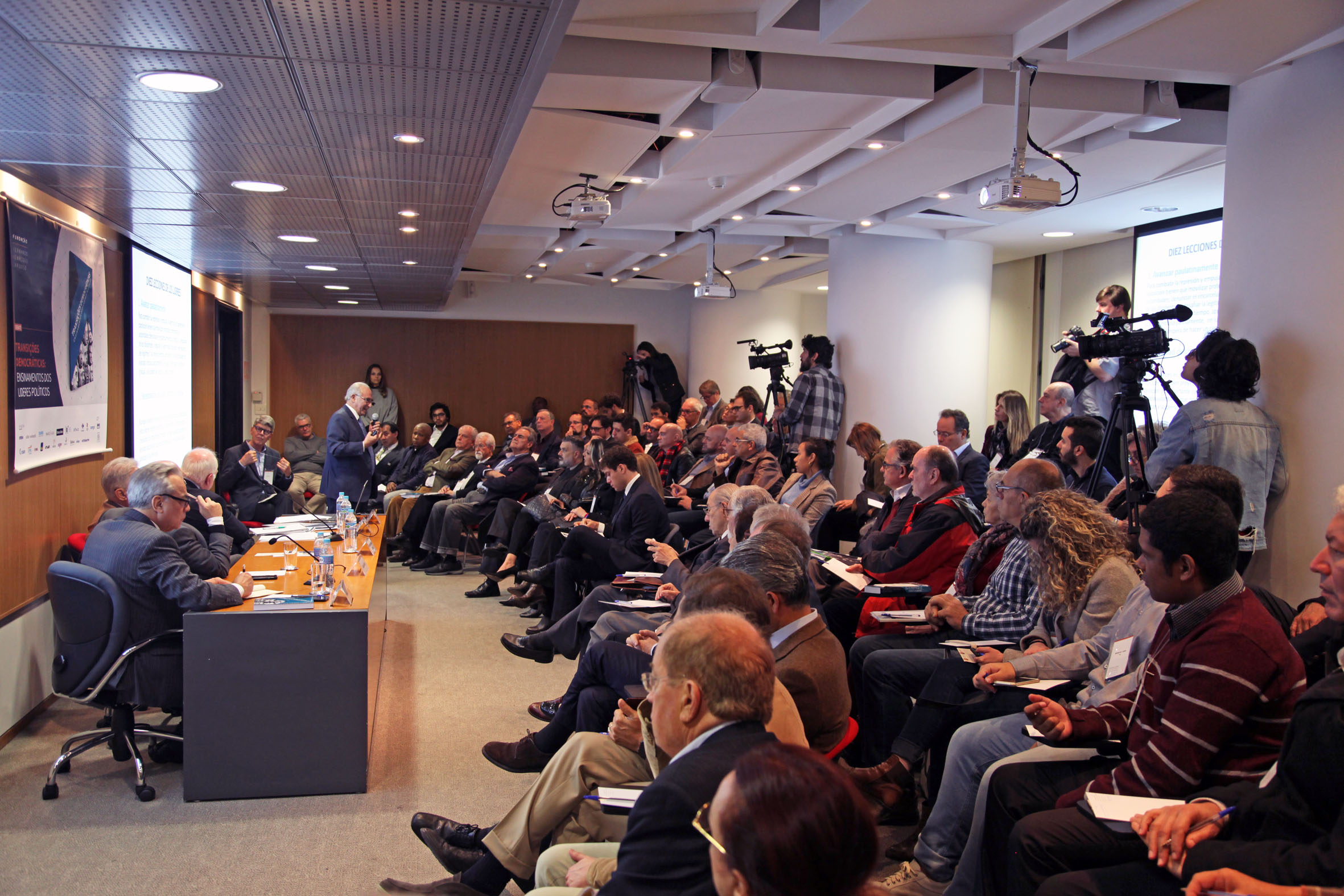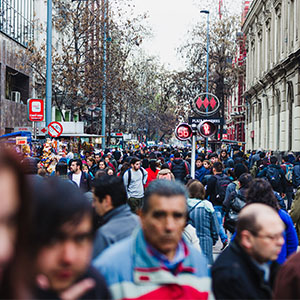At a time when several countries around the world are facing the threat of democratic regression, the pursuit of dialogue and convergence between forces effectively committed to democracy (regardless of their political position) is of particular relevance, as is the strengthening of institutions, habits and conducts that support and strengthen democratic governance in its various aspects, including the rule of law, freedom of expression and the press, and human and minority rights.
This was the takeaway message of the debate Democratic Transitions: Teachings of Political Leaders, which marked the launch of the Portuguese edition of the book with the same name (Transições Democráticas: Ensinamentos dos Líderes Políticos, or Democratic Transitions: Lessons to Face the Threat of Populism), published in Brazil by Editora Contexto, with support from the Fernando Henrique Cardoso Foundation and the Institute for Democracy and Electoral Assistance (IDEA International).
“Eye contact, building trust, and establishing common ground, focusing on what unites us and setting aside what divides us, is critical.”
Sergio Bitar, former Chilean senator, current vice president of the IDEA International Advisory Board, and one of the book's editors.
“How to preserve democracy in the face of subtle or not so subtle threats? In addition to free and clean elections, it is necessary to reinforce 'checks and balances' to prevent the elected official from making decisions without taking into account the opinions and rights of everyone, even those who did not vote for him.”
Abraham F. Lowenthal, an American political scientist, directed the Inter-American Dialogue and is co-editor of the recently published book in Brazil.
“What history shows us is that democratic transitions require two rare qualities to be found in political and social leadership: courage and the capacity for conciliation. It's important to balance the two and avoid betting on the break.”
Fernando Henrique Cardoso, a sociologist, professor, and researcher, was president of Brazil (1995-2003) and is one of the political leaders interviewed in the book.
How is a threat of democratic regression detected in time to be able to work to avoid it? Asked Bitar, who was one of Chile's ministers under President Salvador Allende (ousted in a coup led by General Augusto Pinochet in 1973), and then minister again under Ricardo Lagos and Michelle Bachelet (after Chile's return to democracy). According to him, it is essential to strengthen civil society, state institutions, and parties, as well as the media and the centers of thought, research, and political action. “Without a strategic vision, debates, and concrete action, there is no democracy. We must take every opportunity to move forward," he said.
Ten lessons from the recent past
In the book, the authors studied nine democratic transitions (three in Latin America and two in Europe, Asia, and Africa). They interviewed 13 heads of state who participated in such processes and took ten lessons from their experience. Establishing civilian control over the military, police force, and intelligence services, fostering transnational justice and collective memory, developing inclusive and viable constitutions, forming internal coalitions and mobilizing external support are some of the lessons they abstracted (see full presentation in the Related Content section, to the right of this page).
According to Bitar, we must fight lies and fear, strategies used by authoritarian regimes to keep society at bay: “People living under dictatorships suffer immensely. It is indispensable to show that with freedom and respect for democratic rules and each other, it is possible to build a better future.” Lastly, he advocated for the adoption of responsible economic and tax policies that bring sustained growth and greater social equity because it is essential that citizens realize that their lives improve with democracy.

USA: 'Unrealistic Promises'
What can we learn from the lessons of the past to protect democracy from the growing threat of populism, whether from the right or left? “Institutions are important, but norms even more so. Both must be protected and strengthened day in and day out,” summarized Lowenthal, an emeritus professor of the University of Southern California and author of 17 books on Latin America and US-Latin America relations, as well as numerous essays on Foreign Relations and Foreign Policy.
He has criticized the workings of his country's political institutions over the past three decades: “Even the US, a country historically recognized for the strength of its political, executive, legislative, and major political parties, have not been able to overcome its differences and divisions, and provide answers to problems that have worsened over the past 30 years. And that's not President Trump's fault. The Trump phenomenon is a consequence of the malfunctioning of US political institutions. To combat the effects, the causes must be identified.”
As an example of this institutional wear and tear, he cited survey results showing that in 1964, 76 percent of Americans believed that the government would find answers to their problems most of the time; In 2016, this percentage dropped to 13%.
A supporter of the Democratic Party, the speaker criticized all White House candidates in the 2020 elections. “What qualities should the leader have? Making unrealistic promises is not one of them. The leader must have feasible proposals to solve real problems, strategy, and be able to take practical steps to achieve them. So far, Democratic candidates have not shown to possess them. We have to keep looking (for a good candidate)," he said.
Venezuela: 'sublimate differences'
The very complicated Venezuelan crisis has often been remembered as an example of democratic regression these days. “If world destruction experts had come together to harm a country, they would not have been so successful. Venezuela today is the result of a progressive institutional demolition and an unprecedented economic and social collapse," said Bitar, who lived in the country after being exiled from his own by the Pinochet regime.
Lowenthal lamented that the country seemed so far from finding solutions to its pressing problems: “In the field of democratic opposition, there is a consensus that there has never been a brutal and repressive government like the administration of President Maduro, just as there has never been another case of such a profound and useless economic disaster. But is Venezuela really more polarized than South Africa during apartheid? Or more repressive than Pinochet's Chile? Both countries have been successful in the transition to democracy and, despite the difficulties, are evolving in solving their problems democratically. For Venezuela to rediscover the path of freedom and progress, all democratic forces must unite, sublimate their differences, and focus on what is most important.”
“Transitions to democracy are costly, require an understanding of the moment in time, the obstacles, and opportunities that exist to move forward. They can only be made from within, never imposed from the outside. The most other countries can do is to foster dialogue, monitor negotiations, and support what is requested. Intervening in other ways is not a good alternative,” said former President Fernando Henrique Cardoso.
Brazil: 'historical patience'
Asked by the audience about the direction of the Bolsonaro administration and the country's political polarization, foreign speakers declined to comment. For FHC, it is essential to remain calm: “The current president has done or proposed things that, in my opinion, are not constructive for Brazil. However, he has been elected, and that's something that must be respected. It is important to resist (in order to avoid setbacks), but also to have historical patience. Sharpening animosity is not convenient. For now, Brazilian institutions have shown strength. It is essential to support them.”
Latin America: 'democratic fatigue'
According to Argentine lawyer Daniel Zovatto, co-organizer of the event, Latin America is going through a period of “democratic fatigue,” which paradoxically manifests itself at the end of what he called the electoral supercycle, characterized by three consecutive years of presidential elections in the majority of countries in the region.
Zovatto, who has participated in more than 50 election observation missions, recalled that almost all newly elected Latin American presidents face rapid eroding of their political capital because they do not have a majority in parliament, which makes reform and governance difficult.
“Economic and social advances have stagnated or even ebbed in recent years; we are not generating quality jobs, and over 30% of the region's inhabitants are still living in poverty. To make it even more difficult, violence is increasing in many countries, organized crime is strengthening, and corruption remains a problem," explained the IDEA International's Latin America and Caribbean Director.
He cited research from the Latinobarómetro Institute (Chile) that shows that about 70% of Latin Americans are dissatisfied with democracy. "To make democracies more resilient, democratic rulers must be concerned with delivering concrete results to the population," he concluded.
Otávio Dias is a journalist specializing in politics and international affairs, former correspondent of Folha de S. Paulo in London, and editor of the website estadao.com.br. He is currently the content editor at FHC Foundation.
Portuguese to English translation by Melissa Harkin & Todd Harkin (Harkin Translations).









